First, let me say I am new to woodstoves and new to the forums here. In an attempt to not be that new guy who posts up the dumb "Uhhh, what stove should I buy?" questions, I did my best to educate myself through the stickied threads at the top of the forums and of course, a bunch of other internet reading and videos over the past month or so.
So this thread is more of along the lines of getting feedback on the solution I've reached based on my own muddling. I'm hoping that if I'm on the wrong track, you folks can set me right.
Here's the background: I'm in southeast PA and setting up a machine shop in my garage. The garage was built in the '50s and is built into the hillside, so that the back wall of the ground floor is fully underground. So figure about half of the ground floor is actually underground which is great for insulation (terrible for water ingress... but that's a different matter). The building is two stories plus a walk-up attic. First story is cinderblock, the upper stories are wood framed and the second story, which was originally built as an apartment, is fiberglass insulated. The stairways are currently open with no walls or doorways, although I have temporary plastic sheeting at the top of the stairs leading up from the ground floor. The building is 25' x 25', so 625 sq. ft. per story. There is one 8 ft garage door at the front of the ground floor that I will be insulating shortly!
I have 5 acres, mostly wooded, which is one of the reasons I started looking at woodstoves. I don't mind the labor involved and the wood is free once I get ahead of things and have time to get a good quantity split and dried.
A potential downside I see to a wood stove is that the shop willget cold every night when I'm not there and the machines will take quite awhile to get warm the next day, with so much thermal inertia. A constant thermostatically controlled heat source would be nice, but I don't think I can afford to heat the shop 24/7 with another heat source, be it oil, propane... etc. If it becomes an issue, using wood alone, perhaps I can supplement with another heat source overnight to keep the place at least in the 50-60 range. Thoughts on this are welcome.
I'm mostly concerned with heating the ground floor. I'm sure through convection the second floor will stay semi-reasonable too. I will need to wall off the attic steps because the attic is uninsulated.
It's my understanding that I won't need a big stove for what amounts to 1250 sq feet (625 per floor). I've had a number of people I know recommend Jotul and so I started searching the local used classifieds for a Jotul F3. I found a very nice refurbished one for $950. It's a non-cat stove which I want.
I plan to use Duravent Durablack single wall stovepipe straight out the top of the stove to a support box in the ceiling above the stove, then Duravent double wall stainless 6" Class A pipe straight up from there on up and out the roof.
Pics are worth a thousand words, so I have included some pics below of the garage. I plan on placing the stove in the rear corner of the groundfloor where you currently see the bare blue/green air compressor tank.
Thoughts and recommendations?
Thanks.
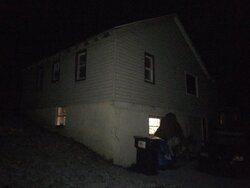
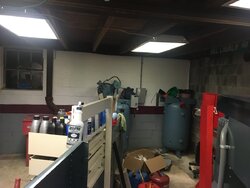
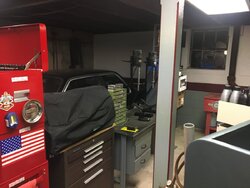
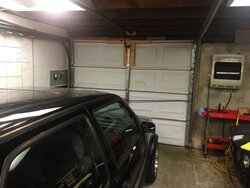
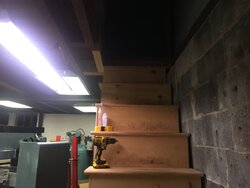
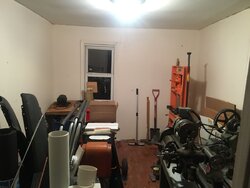
So this thread is more of along the lines of getting feedback on the solution I've reached based on my own muddling. I'm hoping that if I'm on the wrong track, you folks can set me right.
Here's the background: I'm in southeast PA and setting up a machine shop in my garage. The garage was built in the '50s and is built into the hillside, so that the back wall of the ground floor is fully underground. So figure about half of the ground floor is actually underground which is great for insulation (terrible for water ingress... but that's a different matter). The building is two stories plus a walk-up attic. First story is cinderblock, the upper stories are wood framed and the second story, which was originally built as an apartment, is fiberglass insulated. The stairways are currently open with no walls or doorways, although I have temporary plastic sheeting at the top of the stairs leading up from the ground floor. The building is 25' x 25', so 625 sq. ft. per story. There is one 8 ft garage door at the front of the ground floor that I will be insulating shortly!
I have 5 acres, mostly wooded, which is one of the reasons I started looking at woodstoves. I don't mind the labor involved and the wood is free once I get ahead of things and have time to get a good quantity split and dried.
A potential downside I see to a wood stove is that the shop willget cold every night when I'm not there and the machines will take quite awhile to get warm the next day, with so much thermal inertia. A constant thermostatically controlled heat source would be nice, but I don't think I can afford to heat the shop 24/7 with another heat source, be it oil, propane... etc. If it becomes an issue, using wood alone, perhaps I can supplement with another heat source overnight to keep the place at least in the 50-60 range. Thoughts on this are welcome.
I'm mostly concerned with heating the ground floor. I'm sure through convection the second floor will stay semi-reasonable too. I will need to wall off the attic steps because the attic is uninsulated.
It's my understanding that I won't need a big stove for what amounts to 1250 sq feet (625 per floor). I've had a number of people I know recommend Jotul and so I started searching the local used classifieds for a Jotul F3. I found a very nice refurbished one for $950. It's a non-cat stove which I want.
I plan to use Duravent Durablack single wall stovepipe straight out the top of the stove to a support box in the ceiling above the stove, then Duravent double wall stainless 6" Class A pipe straight up from there on up and out the roof.
Pics are worth a thousand words, so I have included some pics below of the garage. I plan on placing the stove in the rear corner of the groundfloor where you currently see the bare blue/green air compressor tank.
Thoughts and recommendations?
Thanks.






Last edited by a moderator:





